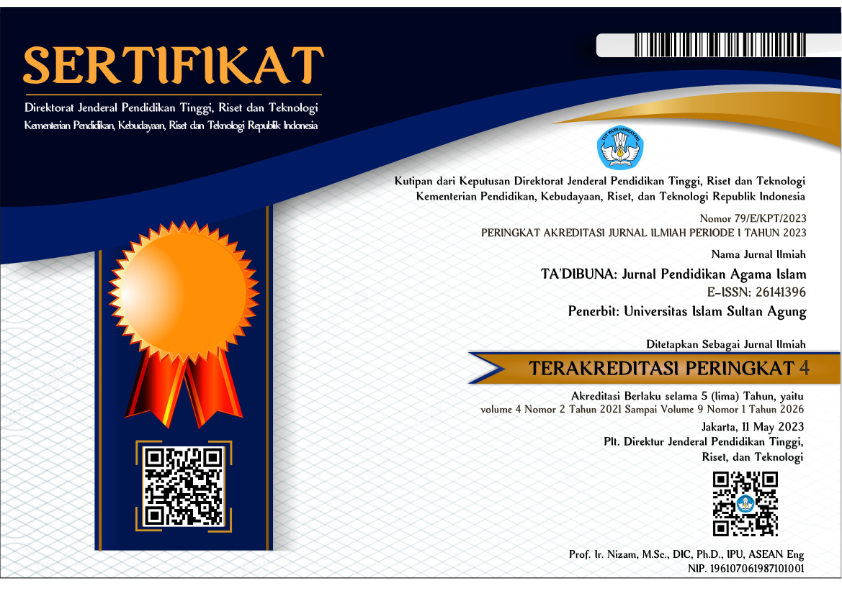Layanan Bimbingan Konseling Perencanaan Individual untuk Menumbuhkan Motivasi Belajar Siswa
Abstract
The role of guidance and counseling teachers in schools is vital in increasing student learning motivation, especially for students experiencing personal and learning problems. The existence of counseling guidance for teachers in each school functions to foster student personality, improve student learning motivation, and overcome student learning problems so that they can become independent students. This study aims to find out: How does the guidance and counseling service build student motivation to learn based on the student's point of view? The research method used is the phenomenological research method. The data collection method was carried out through individual interviews, with the interview duration between 30-45 minutes per person. Data management is carried out using thematic qualitative analysis methods. The results showed that individual planning essential services could assist students in growing motivation to learn because students feel they understand more about the picture of future developments, students feel they have friends to tell stories, students think they get additional insight about scholarships, and students feel they get solutions to individual problems.
Keywords
Full Text:
PDFReferences
Agustina, M. T., & Kurniawan, D. A. (2020). Motivasi Belajar Mahasiswa di Masa Pandemi Covid-19. Jurnal Psikologi Perseptual, 5(2), 120. https://doi.org/10.24176/perseptual.v5i2.5168
Alhasov, Y., Verbytska, A., & Kolenichenko, T. (2020). Teaching english to adult learners within extracurricular activities at university: barriers and motivation factors. Advanced Education, 7(15). https://doi.org/10.20535/2410-8286.195696
Ardianti, T. (2019). Upaya Peningkatan Motivasi Belajar Siswa Melalui Layanan Bimbingan Kelompok Pada Kelas IX Di SMP YAPPA Depok. Jurnal Tindakan Bimbingan Dan Konseling Universitas Indraprasta PGRI, 11(2), 115–124.
Betts, J., Pickart, M., & Heistad, D. (2009). Construct and predictive validity evidence for curriculum-based measures of early literacy and numeracy skills in kindergarten. Journal of Psychoeducational Assessment, 27(2). https://doi.org/10.1177/0734282908323398
Callaman, R. A., & Itaas, E. C. (2020). Students’ mathematics achievement in Mindanao context: A meta-analysis. JRAMathEdu (Journal of Research and Advances in Mathematics Education), 5(2). https://doi.org/10.23917/jramathedu.v5i2.10282
Candela, A. G. (2019). The Qualitative Report The Qualitative Report Exploring the Function of Member Checking Exploring the Function of Member Checking. The Qualitative Report, 24(3).
Che Ahmad, C. N., Shaharim, S. A., & Abdullah, M. F. N. L. (2017). Teacher-student interactions, learning commitment, learning environment and their relationship with student learning comfort. Journal of Turkish Science Education, 14(1). https://doi.org/10.12973/tused.10190a
Chen, P., & Zhang, J. (2020). Development of Chinese Junior High School Students’ Creative Potential: Within-Person and Between-Person Effects of Student–Student Support and Need for Cognition. Frontiers in Psychology, 11. https://doi.org/10.3389/fpsyg.2020.552831
Choi, Y. H., Bouwma-Gearhart, J., Lenhart, C. A., Villanueva, I., & Nadelson, L. S. (2021). Student development at the boundaries: Makerspaces as affordances for engineering students’ development. Sustainability (Switzerland), 13(6). https://doi.org/10.3390/su13063058
Febrina, Z. (2020). Bidang-Bidang Bimbingan dan Konseling. Universitas Negeri Padang.
Gildersleeve, M., & Crowden, A. (2020). “Now it’s your choiceâ€: Nondirective genetic counseling, other minds, place and counselee empowerment. Agathos, 11(1).
Husman, J., & Lens, W. (1999). The role of the future in student motivation. Educational Psychologist, 34(2). https://doi.org/10.1207/s15326985ep3402_4
Jupp, V. (2015). Purposive Sampling. In The SAGE Dictionary of Social Research Methods. https://doi.org/10.4135/9780857020116.n162
Kamal, A. H., & Thoyyibah, N. (2020). Analisis Faktor-Faktor Yang Mempengaruhi Minat Berwirausaha Santri Pondok Pesantren. At-Taqaddum, 12(1). https://doi.org/10.21580/at.v12i1.5330
Khunaifi, A. Y., & Matlani, M. (2019). Analisis Kritis Undang-Undang Sisdiknas Nomor 20 Tahun 2003. Jurnal Ilmiah Iqra’, 13(2). https://doi.org/10.30984/jii.v13i2.972
Liu, R., & Chiang, Y. L. (2019). Who is more motivated to learn? The roles of family background and teacher-student interaction in motivating student learning. Journal of Chinese Sociology, 6(1). https://doi.org/10.1186/s40711-019-0095-z
Miles, M. B., Huberman, A. M., & Saldana, J. (2014). Qualitative Data Analysis.
Muflihah, M., & Aziz, H. (2018). Developing Interactive Multimedia CD-based Teaching Materials for Teaching Arabic Skill at Arabic Education Department of Islamic State University Sunan Ampel Surabaya. Dinamika Ilmu. https://doi.org/10.21093/di.v18i2.1158
Nurjannah, N. (2021). Dasar dalam proses pembelajaran daring di masa pandemi covid-19 melalui intervensi bimbingan dan konseling growing the learning spirit of primary school students in online learning process in covid-19 pandemic through guidance and counseling. 4(2), 71–90.
Rahman, A. (2015). Peranan guru bimbingan dan konseling terhadap pelaksanaan bimbingan belajar di smk negeri 1 loksado. Jurnal Mahasiswa Bimbingan Konseling, 2(1), 1–14.
Yakin, A. Al. (2019). Manajemen Kelas di Era Industri 4.0. Journal Peqguruang: Conference Series, 1(2), 9–12.
DOI: https://dx.doi.org/10.30659/jpai.5.2.146-156
Refbacks
- There are currently no refbacks.
Ta’dibuna: Jurnal Pendidikan Agama Islam is published by the Master Program of Islamic Education, Faculty of Islamic Studies, Universitas Islam Sultan Agung (UNISSULA), Indonesia.
Jl. Raya Kaligawe Km. 4, PO BOX 1054/SM, Semarang, Indonesia 50112
Email: jurnaltadibuna@unissula.ac.id








